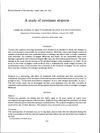Adverse Reactions to Oral Retinoids: An Update
October 1993
in “
Drug Safety
”

TLDR Oral retinoids can cause side effects ranging from mild to severe, including birth defects, and require careful monitoring and contraception.
The 1993 document reviewed the adverse reactions to oral retinoids, which are used to treat skin conditions like acne and psoriasis. It reported a range of side effects, from reversible mucocutaneous reactions and hair disorders to serious and irreversible effects such as teratogenicity. The document noted that up to 15% of patients on isotretinoin experienced reversible musculoskeletal symptoms, while up to 25% had elevated serum triglycerides. Liver function abnormalities were seen in up to 25% of patients on etretinate, but severe reactions were rare. Central nervous system effects, including depression, were reported in 1% of isotretinoin patients. Teratogenicity was a major concern, with a high risk of congenital malformations in babies born to women who had taken retinoids. The document emphasized the need for careful patient monitoring, baseline and follow-up tests, and effective contraception to minimize the risks associated with retinoid therapy.




